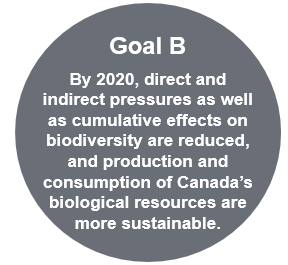Canada Target 8. By 2020, all aquaculture in Canada is managed under a science-based regime that promotes the sustainable use of aquatic resources (including marine, freshwater and land based) in ways that conserve biodiversity.
About the Target
Aquaculture is the farming of fish, shellfish, and aquatic plants in freshwater or saltwater. In Canada, aquaculture represents about one third of the total fisheries value and about 25% of total seafood production by weight. In 2020, by weight, salmon accounted for 86% of finfish aquaculture production and mussels accounted for 57% of shellfish aquaculture production. If not sustainably managed, aquaculture operations can have different environmental effects that range from local nutrient or chemical deposits into water systems to direct risks to wild species, such as habitat alteration and potential disease spread.
Ongoing efforts, in partnership with different levels of government, Indigenous groups, and industry are essential to ensure the health of ecosystems in which aquaculture takes place.
A science-based regime that ensures environmental impacts are mitigated through effective regulation and management is also key. These efforts will help foster a sustainable industry that contributes to Canada’s biodiversity goals.
Canada Target 8 is linked with the following global Aichi target under the United Nations Convention on Biological Diversity Strategic Plan for Biodiversity 2011-2020:
Aichi Target 4 - By 2020, at the latest, Governments, business and stakeholders at all levels have taken steps to achieve or have implemented plans for sustainable production and consumption and have kept the impacts of use of natural resources well within safe ecological limits.
Aichi Target 7 - By 2020 areas under agriculture, aquaculture and forestry are managed sustainably, ensuring conservation of biodiversity.
2020 Final Assessment
One measure of progress is the degree of compliance with Canada’s aquaculture management regime. In 2020, 201 inspections of aquaculture operations were conducted by Fisheries and Oceans Canada while 39 warnings were issued, and no charges were laid. From 2011 to 2020, over 97% of aquaculture operations inspected by Fisheries and Oceans Canada did not result in charges. Common types of concerns identified during inspections include inadequate record keeping, inadequate markings and signage, improper storage and tagging of equipment, feed, and chemicals, and deficiencies with nets, cage arrays, or other structures.
The target has been met as aquaculture in Canada is managed under a science-based regime. Fisheries and Oceans Canada and partners continue to take an adaptive management approach based on evolving science, and work is ongoing to further improve compliance with the regulatory regime (see Contributing Actions).
Contributing Actions
Fisheries and Oceans Canada is implementing its Framework for Aquaculture Risk Management. The Framework includes adapting management approaches to consider such things as the results from environmental monitoring, scientific advice, routine re-evaluation, and new technologies. The Framework also calls for heightened public transparency and the use of the precautionary approach. These approaches to assessing environmental risk will inform development of new policies and management approaches, such as area-based management.
The Aquaculture Collaborative Research and Development Program (ACRDP) is a Fisheries and Oceans Canada initiative that promotes collaborative research activities between the aquaculture industry and the department, teaming industry representatives with Fisheries and Oceans Canada researchers. A key objective is supporting research that will enhance the overall environmental sustainability of aquaculture operations in Canada.
Aquaculture, including new aquaculture technologies and processes to improve environmental performance and increase supply chain transparency, is a priority under the British Columbia Salmon Restoration and Innovation Fund.
External Advisory Committee on Aquaculture Science with Fisheries and Oceans Canada has strengthened its evidence base for decision-making by including external input on aquaculture science. The External Advisory Committee on Aquaculture Science was created to help ensure the department has access to external perspectives when designing its research programs. It also aligns with recommendations from the 2018 Report of the Independent Expert Panel on Aquaculture Science. The committee’s advice will include perspectives on emerging science relevant to the needs of decision-makers. The small committee includes academic, Indigenous and international representation.

